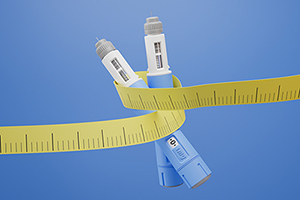



| By Dr. Ronald Hoffman
These days, it’s not often that breakthrough nutritional products arrive on the market—sometimes it seems like everything worth inventing has already been devised! Where are new nutrients that are the modern equivalents of blockbusters like EGCG, Ubiquinol, and alpha lipoic acid of days gone by?
 It takes a lot to move a supplement from my radar screen to my highly-recommended list. And it requires much careful research on my part; additionally, I like to “field-test” products on myself, as well as my family members and friends before recommending them to my patients and listeners.
It takes a lot to move a supplement from my radar screen to my highly-recommended list. And it requires much careful research on my part; additionally, I like to “field-test” products on myself, as well as my family members and friends before recommending them to my patients and listeners.
Lately, the following nutraceuticals have won me over!
1) Mega 10: OK, so you’ve heard of Omega 3 (EPA & DHA) and Omega 6 (GLA) and perhaps you’ve even heard of Omega 9 (oleic acid from olive and canola oil). But have you heard of Omega 7?!
Otherwise known as palmitoleic acid, an Omega 7 monounsaturated fat, researchers are coming to recognize it as heart-healthy and anti-inflammatory. It is present to a high degree in macadamia nuts, sea buckthorn, and full-fat (but not skim) dairy products.
The latter may account for the fact that recent meta-analyses are hard-put to find any cardiovascular disadvantage to high consumption of fat-rich dairy products, commonly thought to be “artery-clogging.”
Palmitoleic acid is sometimes referred to as a “lipokine,” i.e., a fat that doesn’t just deliver calories, but with beneficial metabolic effects on obesity and insulin resistance. Specifically, it has been shown to lower high sensitivity C-reactive protein, a marker of arterial inflammation which is a contributor to heart disease risk.
Actually, the name “Mega 10” is kind of a misnomer, because there’s no such thing as “Omega 10”; this product is a combination of Omega 7 with Omega 3 (7+3=10). It is designed to deliver the cardiovascular, anti-inflammatory, and insulin-regulating properties of palmitoleic acid, EPA, and DHA in synergistic fashion.
2) Cogumin SCLP: Curcumin is emerging as a major nutraceutical breakthrough with effects against cancer and inflammatory conditions. We have long been using a highly bio-available form of curcumin, Meriva, for ulcerative colitis and Crohn’s Disease, muscle and joint pain, and for cancer prevention and treatment.
A new frontier of curcumin research envisions benefits for brain disorders. Neurodegenerative conditions like Alzheimer’s, Parkinson’s, ALS, and MS are thought to have an inflammatory component, and curcumin is undergoing intense research as a therapeutic agent. A major new insight is that curcumin may even help combat depression, since the root of this “psychological” disorder may be at least in part inflammatory.
But the problem with curcumin has been its lack of bio-availability. Much of dietary curcumin, say, from the turmeric used in curry spice, is not well-absorbed into systemic circulation. Additionally, the blood-brain barrier keeps many foreign substances out of the central nervous system (CNS).
The problem seems to have been at least partially alleviated with a new, innovative form of curcumin called Cogumin SCLP, harnessing Solid Lipid Curcumin Particle technology to breach the blood-brain barrier and allow for higher CNS concentrations. These days, I still use Meriva for most inflammatory conditions or cancers, but opt for Cogumin SCLP where the brain is concerned.
3) ProtoSorb Magnesium: Magnesium is in some ways like curcumin. Many poor quality magnesium products literally run right through you, producing a laxative effect. We sometimes take advantage of that by prescribing magnesium citrate to our constipated patients, with excellent results. Trouble is, very little of that magnesium gets into the bloodstream. Even then, since magnesium is an intracellular mineral, the trick is to get the cells to absorb it where it can do some good.
The problem has been partially solved with great premium bio-available forms of magnesium like magnesium taurate, magnesium glycinate, and Jigsaw Magnesium. But, as with curcumin, it’s difficult to get magnesium to be taken up in the brain.
Why is that important? Since magnesium is an essential co-factor for energy production, and the brain is the most actively metabolizing organ in the body, adequate magnesium might address many brain syndromes. I’ve found it to help alleviate Chronic Fatigue Syndrome, migraines, and more recently it has been shown to possibly relieve depression.
A new form of magnesium, magnesium L-threonate, is thought by many to have greater affinity for the central nervous system than other forms of magnesium. A recent study showed that magnesium L-threonate could alleviate memory loss associated with chronic pain. Another paper showed that it can reduce anxiety in experimental animals.
4) Ron Teeguarden’s Dragon Herbs He Shou Wu: I know that Chinese herbs have gotten a bad rap lately. It’s the fault of greedy and unscrupulous Chinese herbal manufacturers who have “poisoned the well” for reputable Traditional Chinese Medicine players by introducing poorly manufactured and sometimes overtly tainted products. Some contain unacceptable levels of lead, mercury, cadmium and chemical solvents; some are deliberately laced with traces of pharmaceutical drugs like steroids and male potency enhancers.
As a result, Ron Teeguarden’s Garden Herbs has sought to provide safe, well-assayed, approved versions of traditional Chinese herbs. One such formula is He Shou Wu, one of the most popular and highly revered tonic herbs in Asian herbalism. It is widely used in Asia to maintain the youthful condition and color of the hair.
I’m generally skeptical of “hair formulas,” but many patients have told me that He Shou Wu has helped revitalize their hair and gets rid of the gray. In any case, it’s a wholesome adaptogen, prized for its tonic abilities to support energy, but without a jarring, caffeinating effect.
5 & 6) Candibactin AR & BR: I stumbled across these products after interviewing Alison Siebecker last year on the subject of SIBO (Small Intestine Bacterial Overgrowth).
There’s a new drug that is highly touted for the eradication of SIBO: rifaximin, or Xifaxin. It’s expensive and may entail a hefty co-pay for patients. While sometimes effective, as often as not it fails to alleviate SIBO long term.
A more cost-effective natural way of dealing with SIBO is to use the Candibactin one-two punch. While its name implies it’s just targeted to intestinal fungal overgrowth, the herbs in Candibactin AR and BR have a broad-spectrum effect against both Candida and troublesome bacteria.
In fact, a recent article in Atlantic Magazine entitled “Essential Oils Might be the New Antibiotics” suggests that aromatic herbs like thyme, oregano, and sage (the main ingredients in Candibactin AR) might become preferred alternatives to our pervasive over-reliance on antibiotics in farm animals. They sidestep the problem of antibiotic resistance and are in the long run safer and cheaper. Human applications may not be far behind for resistant E. coli and staph infections.
Candibactin is composed mostly of berberine, a compound traditionally used for its anti-infective properties in the GI tract, along with synergistic herbs to aid digestion and detoxification.
I generally start patients with IBS or SIBO on one Candibactin BR twice daily with food, then add Candibaction AR twice daily. Once these are tolerated, I try to double up to two of each twice daily with meals for 3-6 weeks, then drop down to one twice daily of each for maintenance.
The products listed above are on track to be hot items for 2015, and I’m looking forward to seeing how my patients respond to these more effective treatment options. I encourage you to share this information with any friends who may be able to benefit from their effects.
Though we think of declining estrogen as the hallmark of menopause, it's actually common for…

Up to 12 percent of Americans have ulcers at some point in life. Peptic ulcers…
Gallbladder disease is a modern illness. An estimated 20 million Americans have gallbladder disease. The…

New, more powerful weight loss drugs: Drugs like Wegovy, Rybelsus, Ozempic and Mounjaro/Zepbound are revolutionizing…

According to the Lancet, autoimmune disease affects one in ten people globally and it’s now…

This past week we were regaled with headlines like: High levels of niacin may increase…

Leyla Weighs In: The Erosion of Trust in Nutritional Research

Our virtual voicemail is open 24/7, so there's no need to wait to submit your questions for Dr. Hoffman. Leave a message, and you may hear your question featured on the Intelligent Medicine radio program!